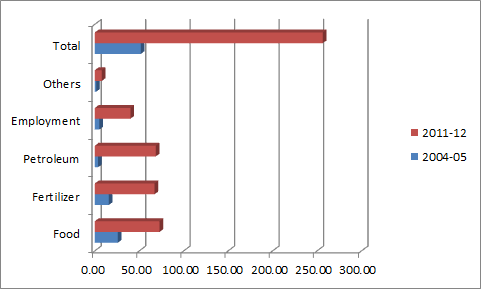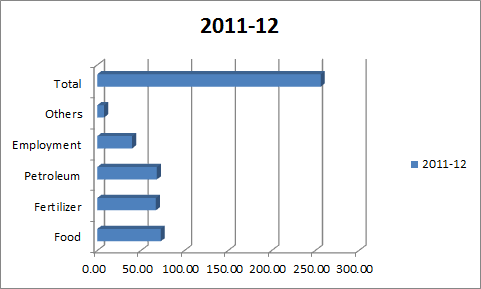In our last article, Shaelja and I detailed the veritable explosion of government subsidies between 2004-05, when the United Progressive Alliance government took control, and 2011-12. The chart here makes that obvious at a glance.
Subsidies in 000s of crores

Between the years 2004-05 and 2011-12, total subsidies grew by a whopping 396 per cent while the GDP increased by a more modest 75 pc. When this government assumed charge, subsidies were a modest 1.74 pc of GDP. They currently amount to an unsustainable 4.91 pc of GDP. Clearly, subsidies have to be cut drastically if bankruptcy on the external and internal debt front is to be avoided.
Is this politically feasible, must be the key question agitating the minds of politicians. General elections are due in 2014. Between now and then, either the ruling party has to put its house in order or postpone reforms to after the elections for the next government. Should the reforms be postponed to after the elections, it should be obvious that the next government will have a huge mess on its hands, with little reserves and no room for manoeuvre. Therefore, it is in the interest of all politicians, ruling and opposition who hope to grab power in the next elections, to resolve the mess here and now. How can it be done?
Contrary to the general impression created by our flawed political discourse, most of the incremental subsidies over the levels prevailing at the end of 2004-05 have gone to the well-off middle class, rich and the corporate sector. Subsidies to the poor grew from R25.4 thousand crores to R90.8 thousand crores and at the end of 2011-12 amounted to no more than 1.74 pc of GDP.
In contrast, subsidies to the rich and corporate sector grew from R26.19 thousand crores to R165.48 thousand crores, amounting to over 3.16 pc of GDP at the end of 2011-12. Clearly, it is not welfare programmes for the poor that have led to the explosion in subsidies. Instead, it is the unwillingness to raise administered prices of goods like petroleum-based fuels and fertilisers that antagonise the middle class that ballooned the subsidy bill. Political pusillanimity in the face of the powerful, rather than philanthropy for the poor, is the real malaise that grips this government.
A glance at the composition of subsidies at the end of 2011-12 makes the steps necessary to resolve the mess obvious.
Subsidies in 000s of crores, 2011-12

Only about R3481 crores of the subsidies on petroleum based fuels go to the poor BPL families. The rest, amounting to R68.44 thousand crores, goes the middle and upper classes; people with a marginal savings rate of 30 pc or more. Surely, this class of people can pay the economic cost of fuels they use much like their counter-parts in poor countries like Bangladesh and Pakistan. There is absolutely no economic case for subsidising petroleum-based fuels to anybody except the BPL families.
Fertiliser subsidies comprise two parts. One half is an outright production subsidy to urea manufacturers. That this subsidy goes to farmers is mere convenient fiction. With fully depreciated plants, manufacturers have no economic case for the continuation of such subsidies. The other half comprises import subsidies to DAP [diammonium phosphate] fertilisers where local production is minimal. There is global shortage of DAP due to depleting reserves of phosphates that is never going to go away. Farmers in any case are given a cost-based support price for their produce. It is far better for the government to cutoff subsidies to manufacturers and importers and to instead compensate farmers through higher support prices. A onetime adjustment in food prices is not inflationary. In fact, it will be deflationary. Prices will soon settle down and in the long run inflation will come down.
No reform can happen unless it benefits the ruling party. Such is the utter cussedness of our politicians and political system. So is there some way that a skilled politician like Sonia Gandhi can be made to see direct self-interest in reforms? Consider.
Recall that one of the key reasons for the UPA's victory at the last polls was the bank loan writeoffs given to farmers. Can something like that be worked out without increasing net subsidy? It turns out that you can have a strategy to win the 2014 polls through reforms, although it means hard work and high political risk. So let us examine this strategy.
The strategy involves the following steps pursued by Sonia Gandhi. In the ruling party only she has the stature to pull it off successfully and it is in her interest to see this through to completion anyway.
1. Sonia Gandhi should put the full weight of her political authority, in party and government, to implement the Adhar Scheme in a manner that the payment of subsidies to farmers and BPL families, in at least a few of the Congress-ruled States, becomes feasible well before the 2014 elections. Just cut through the bureaucratic infighting and make the UID-based scheme for payment of subsidies directly to beneficiaries in cash happen. Once the poor and the farmers see actual cash in their bank accounts, all argument will cease. This is the payoff for the Congress in its real support base.
2. The subsidies to be paid directly to beneficiaries should include food, fuel, and in the case of farmers, urea-based fertilisers. All subsidies to urea manufacturers should be phased out. Subsidies to DAP importers can continue till a mechanism is designed to pay farmers directly or the cost of the same is included in minimum support price mechanism for food crops.
3. Remove all petroleum-based subsidies except one, or at most two, cylinders per family. Make consumer pay full price for LPG and credit the subsidy for the same directly to their bank account once a month. Consumers who want the subsidy should be asked to fill out a form based on their voter's card or UID when available to claim the subsidy. Likewise, self-employed transport operators who oppose reduction in diesel subsidies, should be offered a fixed subsidy in cash for a certain amount of diesel payable into their bank account every month. For the rest, everybody should pay the economic price of all fuels.
Note, if the government can knock off R68 thousand crores of fuel subsidies and about R25 thousand crores of fertiliser subsidies, the total subsidy bill comes down to R163 thousand crores which is about 3.1 pc of 2011-12 GDP.
Should Sonia Gandhi be able to push through the UID scheme and have it implemented in a few Congress-ruled states, something entirely feasible given the time frame, she has a good chance of not only eliminating fuel subsidies but also implementing her pet Food Security Bill that she hopes will fetch her more votes.
Gandhi will have realised by now that her NAC-based agenda, right or wrong, was defeated by simply crowding out the poor by the middle class and the rich snouts at the subsidy trough. She can push back vigorously using the UID as a tool to focus sharply on the poor and eliminate needless subsidies to the well-off. Direct cash payments will empower and enthuse the poor like nothing else. So the Congress gets a rich harvest of votes. And the total subsidy bill will have come down from close to five pc of GDP at present to something like three pc of GDP which will give our economy some breathing space to reform and restructure for more sustainable growth. UID, and elimination of petroleum subsidies, is her key to the next election.
Pertinent to note that in case Gandhi and the Congress do not pick up the courage to take the above steps now, the government that takes over in 2014 will have little option but to take these steps anyway.
In other words, for us voters the real choice is between the government doing it now or after elections in 2014. The earlier the better. Subsidies are a cancer gnawing away at the vitals of our economy.




